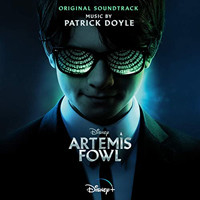- Composed by Patrick Doyle
- Disney / 58m
A series of fantasy books for children, Artemis Fowl is about a young criminal mastermind who, in this first in a planned series of films which is likely to end up being a series of one, must rescue his kidnapped father with the help of his faithful dwarf. Kenneth Branagh’s film stars Ferdia Shaw in the title role with adult help from Josh Gad, Colin Farrell and Judi Dench, whose appearance has at least stopped people talking about her appearance in Cats, a film not renowned for its generous appraisal by critics – but which has double the Rotten Tomatoes approval of this one, by far the most savaged of Branagh’s distinguished career.
At least one part of it is pretty immune from criticism and that is Patrick Doyle’s engaging score. While it’s not from his top drawer, there’s a lot to like about it. The story incorporates a lot of Irish fantasy elements and that leads to a Celtic sound that produces a score that’s a bit like Brave crossed with one of the composer’s more contemporary action scores like Jack Ryan: Shadow Recruit.

The music is at its strongest at either end of the score. It opens with the outstanding “Father and Son” which presents a truly beautiful main theme representing that relationship – while Doyle doesn’t hammer home the Celtic feel with the instrumentation in this piece, it does have certain intonations that give it that sound and I find it lilting and lovely.
We do get the uilleann pipes and pennywhistles and so on in the next cue, “Talented Tunneler”, used in an interesting, textural way rather than carrying the melody, and accompanied by some more modern action stylings, pushed further in the next cue, “Surfing”, which is highly entertaining.
In “Time to Believe” Doyle introduces an action ostinato which is to play quite a prominent role through the score – it’s a bit jarring to hear it coming from him because it’s just not a style of music I’d associate with this composer, but it’s done well. There’s a grand fantasy sound to the start of “Haven City” which is pushed even further in the subsequent “Commander Root”, which is grand and dramatic and interestingly turns that action ostinato into quite a broad theme.
From this point the score becomes more action-heavy – while “You’re Not Going” starts with a gorgeous violin-led lament, midway through it turns into what an Irish jig might have sounded like had Hans Zimmer been born 200 years earlier and in Dublin. I must admit the sequence of tracks that follow begins to drag a little for me – there’s nothing wrong with it as contemporary action music (though there is a bit of “grandad synths” going on – maybe think of latter-day Alan Silvestri when he does similar things). There are some highlights here though – the ending of “To the Surface” has an epic grandeur to it; the brassy variant on the action theme in “Containment” is great; “Battle Stations” has some nice big, juicy action in it; and there’s a brief break from the action in the gorgeous “The Artist”.
After chugging along for a while, the next highlight comes in “Troll Fight”, which takes that now-familiar action motif and adds a whole heap of excitement around it. This initiates a closing 20 minutes to the album which is really strong – next comes the tender “The Fatal Blow”, in which the composer introduces a lovely, warm new theme which recalls some of the highlights of his Harry Potter score; and then perhaps the finest action cue of the score, the dynamic and breathless “Collapse”.
“A Dear Friend” includes a nice reprise of the opening theme before the recently-introduced secondary theme gets its own reprise in “Worth Fighting For”, the best piece of music on the album – vintage Patrick Doyle. Surprisingly that’s not the finale, there’s actually one last piece of action music which serves that role (“That’s My Ride”) – it’s good but I think the album would be better-served if the order of the final two tracks were to be swapped.
The highlights of Artemis Fowl are so strong that I can forgive the album for sagging in the middle (it’s probably got 20 minutes on it that needn’t be). I’m not sure this is really where Doyle’s naturally at his best – it is telling that most of the highlights are where he pushes the emotional side of thing – but he’s more than capable of handling this type of film. His collaboration with Kenneth Branagh has produced such strong scores that I doubt this one will figure that highly on anyone’s lists, but that’s more a reflection of how good most of them are rather than there being much wrong with this one.
Rating: *** 1/2
facebook.com/moviewave | twitter.com/MovieWaveDotNet | amazon.com












This Horner guy…
I just wanted to alert you to the fact that the email you sent out regarding this review says that the score is composed by James Horner. I took a screen shot of it, but I don’t see anyway to display images in your comments.
Thank you for this. Gonna check it out on Spotify.
[…] […]